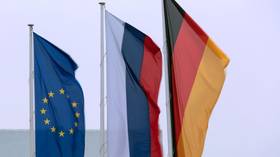German companies see Russia as 'huge opportunity' despite sanctions – head of Merck Russia

German businesses has always viewed Russia as a lucrative market and they believe now is a good time to invest in the country despite international tensions, the president of the Russian branch of Merck told RT.
German investment in the Russian economy hit a record high in 2018, reaching $3.6 billion. Merck Russia is a branch of the German multinational pharmaceutical, chemical and life sciences company. Juergen Koenig, its president and general director, believes the increase in investment is another indication of a lucrative partnership that has historically existed between the German and Russian businesses.
RT:What has triggered such record-breaking German investment in Russia?
Juergen Koenig: We should understand that commercial relations between Germany and Russia didn't start yesterday. There is a long history in culture and businesses bringing the two countries together. One classic example is Merck, a science and technology company, which just celebrated the 120th anniversary of its operations in Russia.
To Merck, Russia is not just one more market. Russia has a population of 140 million inhabitants. Apart from Russia, there are other Eurasian countries. In total, around 280 million people live in Eurasia. Now, if we consider the existing development plan for Russia and some other close countries, we can conclude that there is a huge opportunity.
On the other hand, we should not forget that Germany's economy is based in great part on medium and small companies, and it's normal that these companies will always look for opportunities. By the way, this is a perfect model to reduce risks in a country. I can see that it started to be promoted and implemented in other countries.
Also on rt.com France’s Total to invest in Russian LNG terminals in Arctic & Far EastRT:Does this trend exist only in Russian-German relations or with other countries as well?
JK: If the opportunity was viable, the trend was always there. A few decades ago, Germans decided to invest in South America. Later, in Asia, and so on. If we analyze the future growth possibilities it will be easy to detect the investors route in advance.
RT:Does it mean that sanctions have no effect on the Russian economy or that without sanctions this figure could be much higher?
JK: Part of this figure is certainly because of the sanctions. Taking the area of food and beverages as an example, with the sanctions the local producer, manufacturer and supplier needed in a short time not only to increase the volume produced, but also the quality, to ensure that market share will be granted. This was done very fast. The conclusion is that the sanctions had a positive effect in certain Russian market segments.
Also on rt.com German investments in Russia highest in decade despite Western sanctionsRT:Do German businesses feel any pressure from third parties in their work with Russian partners? If so, how do they deal with it?
JK: As a family-owned multinational company with strong values, Merck will always follow the established rules and will find ways to do businesses in line with managerial and compliance principals.
Merck believes in the dialogue, share opinion and win-win models. This was one of the reasons, certainly, why the company was able to celebrate the 350th foundation anniversary.
As part of the celebration, a 'Merck Science Dialogue' and the performance of the 'Deutsche Philharmonie Merck' was organized recently at the Stanislavsky Theater in Moscow with the support and endorsement of governments, scientists and businesses representatives. The "German-Russian Years of Science 2018/2020" is a good example of the collaborative mindset between countries and businesses.
Also on rt.com Russia’s Arctic shipping route to attract over $11 billion in investmentsRT:Why, in your opinion, has Russia become more interesting for small and medium German businesses?
JK: Russia is not only and suddenly interesting for medium and small companies. The "Made in Germany" was always linked to quality and innovation and appreciated by the Russian consumer. This is a clear reason for German investors to be present in the local market. These companies have always been here doing businesses in different kinds of setups.
It is also important to see that these companies normally will not have the financial backup to invest concomitantly in all regions and markets at the same time. In most of the cases, these companies will establish themselves in one market after the other. Most probably, now is the Russian time.
Like this story? Share it with a friend!














